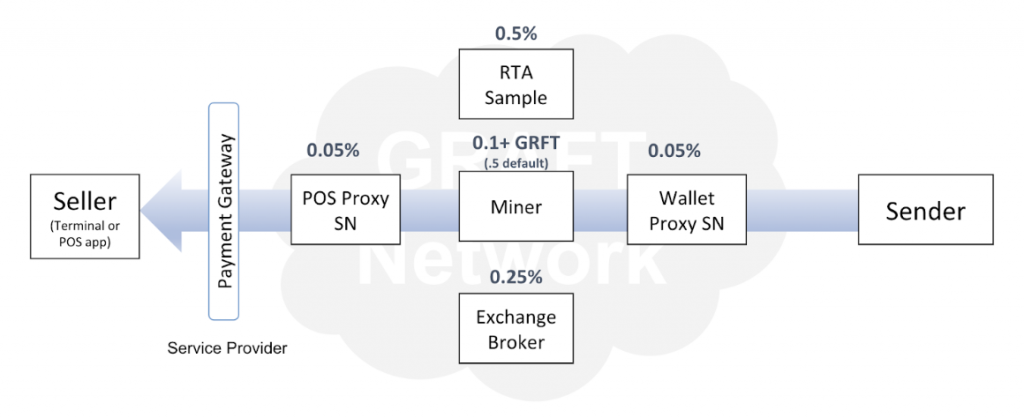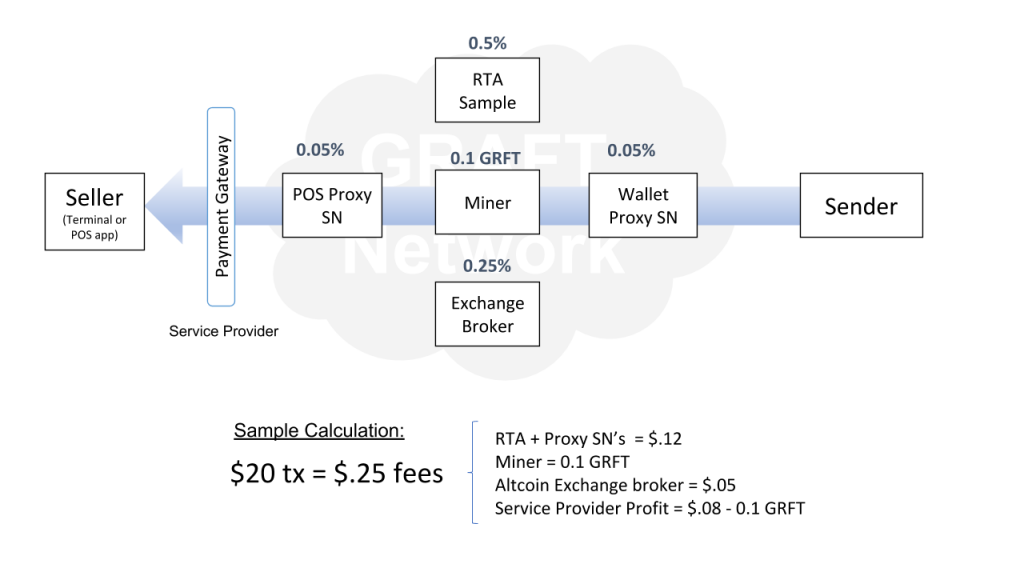- Full Supernodes RTA Fee (any RTA Tx): 0.5%
1/8 of this fee, or 0.0625% of the total RTA Tx amount, goes to each supernode participating in the RTA authorization sample.
-
Proxy Supernodes Fee (any RTA Tx): 0.1%
1/2 of this fee, or 0.05% of the total RTA Tx amount, goes to each supernode in the proxy pair that provides connectivity into the network (wallet and POS proxy supernodes).
-
Wallet Proxy Supernode Fee (non-RTA transfer): 0.1 GRFT
This small fee is going to be charged by the wallet proxy supernode to the mobile or desktop sender’s wallet in addition to the existing network fee (miner’s reward).
-
Exchange Broker Fee (RTA with altcoins): 0.25%
Exchange brokers include pay-in, payout, top-up, and interchange brokers.
-
Miner Transaction Fee (RTA): variable
Determined by the merchant service provider through the payment gateway, but not lower than 0.1 GRFT.
 Figure 1: GRAFT Ecosystem Fees
Figure 1: GRAFT Ecosystem Fees
If a particular RTA transaction is processed via the payment gateway, which will be the case for most hardware payment terminals, the fees are set and calculated by the MSP (merchant service provider). This occurs through the payment gateway plugin to the POS proxy supernode using the information about the pay-in and payout currencies as input, and setting a miner fee commensurate with the service level they are obligated to provide to the merchant.
Here’s a table-form summary of various fees in combination with various workflows:
| 1 | 2 | 3 | ||
| Regular P2P Transfer | RTA Tx (GRFT) | RTA Tx with altcoin exchange broker (i.e. bitcoin acceptance) | ||
| a | Sender’s wallet proxy Supernode Reward | 0.1 GRFT * | 0.05% * | 0.05% * |
| b | Full Supernode (auth sample member) Reward | N/A | 0.0625% ** | 0.0625% ** |
| c | Exchange Broker Reward | N/A | N/A | 0.25% ** |
| d | Miner (settlement) Reward | Variable, based on Tx size in KB | Configurable *** Min: 0.1 GRFT | Configurable *** Min: 0.1 GRFT |
| e | Merchant POS/Recipient Gateway Proxy Supernode Reward **** | N/A | 0.05% **** | 0.05% **** |
| Total Fee Amount paid by the Tx sender (buyer in RTA) | a1 + d1 | 0 | 0 ***** | |
| Total fee amount paid by the Tx recipient (merchant in RTA) | 0 | a2 + b2*8 + d2 + e2 | a3 + b3*8 + c3 + d3 + e3 | |
| Total amount charged to the Tx sender | Tx amt + a1 + d1 | Tx amt | Tx amt | |
| Total funds available to the Tx recipient | Tx amt | Tx amt – (a2 + b2*8 + d2 + e2) | Tx amt – (a3 + b3*8 + c3 + d3 + e3) |
* wallet proxy supernode can be a proprietary server or a public cluster hosted by a service provider. You can run and use your own proprietary proxy supernode to avoid the proxy fee altogether. The supernode must have a stake in order to be able to charge the fee.
** stake is required for full supernode or exchange broker in order to participate in RTA Tx processing and receive this reward
*** set by the merchant service provider or the owner of the POS proxy supernode
**** POS proxy supernode can be a proprietary standalone server, a part of the merchant infrastructure, or a part of a payment terminal or/and ecommerce gateway maintained by the merchant service provider. POS supernode must have a stake in order to be able to receive this reward
***** does not include the altcoin network fee
You can see that the new fees have been introduced on proxy supernodes—both wallet proxy and point-of-sale/payment gateway (a1, a2, a3, e2, and e3 in Table 1). Those changes will achieve increased decentralization of the infrastructure, which means no more complaints about GRAFT wallet downtime or delays! If you don’t like the proxy supernode cluster hosted by GRAFT, there will be alternative providers ready to serve your wallet or POS. In order to receive the reward, the proxy supernode must demonstrate the unique stake wallet linked to the supernode’s public IP address. The amount of proxy stake is 250,000 GRFT.
Unlike an authorization sample supernode, the proxy supernode will still be operational even without the stake, however an unstaked proxy supernode won’t be able to charge the fee. This option is reserved for proprietary proxy supernodes, so the users with elevated privacy needs can host their own entry points to the network. Without the stake, the proxy reward will be sent to the GRAFT community donation wallet address. This way the total transaction fee, which is assembled from several components, always remains consistent regardless of the status of the proxy supernodes.
Another major change, which was partially proposed earlier, is the flat fee paid to the miner for RTA transaction settlements (d2, d3). The miner’s fee is traditionally calculated based on transaction record size in KB (d1). With RTAs, however, we cannot make the miner fee variable as it would make the total fee paid by the merchant inconsistent and unpredictable, which is unacceptable in most situations. Additionally, we cannot make this fee proportional to the value of the transaction (similar to the supernode fees) because miner fees are visible on the blockchain, meaning the transaction amount could be calculated from a proportional fee (although we may fix this in the future). Therefore, we made it a simple configurable flat fee, with a minimum amount of 0.1 GRFT.
The fees associated with RTA transaction with exchange brokers are the same as RTA fees (column 2) with an extra 0.25% taken by the broker (and paid also by the merchant).
Merchant Fees and Service Providers
The MSP sets a fee schedule that’s consistent with their business model and fees could be structured in tiers with options, for example:
- Transactions below $10: 2%
- Transactions above $10: 1%
- Min transaction amount: $1
- Miner: 0.1 GRFT
- Transactions in altcoins: + 0.25%
- Instant payouts in altcoin or fiat: + 0.25%
Below is an example of a sample $20 altcoin transaction and the associated fees given a reference Merchant Service Provider fee schedule.
 Figure 2: Example of GRAFT RTA Altcoin Tx Fees and Rewards with Service Provider
Figure 2: Example of GRAFT RTA Altcoin Tx Fees and Rewards with Service Provider











